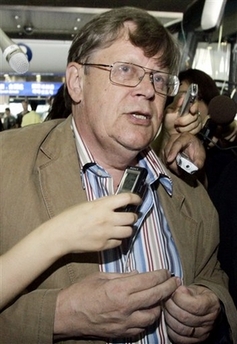UN nuclear monitor to visit N.Korea
(AP)Updated: 2007-06-25 13:36
BEIJING - How to verify that North Korea is shutting down its main nuclear reactor will dominate the agenda for a rare UN visit this week to DPRK, a senior nuclear monitor said Monday.
 Olli Heinonen, the International Atomic Energy Agency's deputy director general for safeguards talks to journalists after arriving the airport in Beijing Monday, June 25, 2007. [AP]  |
"Now we are going to go to negotiate the details: how to verify and make sure the reactors will be shut down at Yongbyon," Heinonen told reporters upon arrival at Beijing's International Airport.
He said he was unsure whether he would have a chance to actually visit the Yongbyon site.
North Korea, which expelled UN inspectors in late 2002, announced last week that it invited a "working-level delegation" to discuss procedures for shutting down the plutonium-producing facility.
North Korea had pledged in February to shut down the Yongbyon reactor, and IAEA Chief Mohamed ElBaradei traveled to North Korea in March in what was billed as a landmark visit.
But Pyongyang refused to act on the promise until it received about $25 million in funds that were frozen in a Macau bank amid a dispute with the US over alleged money-laundering.
The funds were freed earlier this year, but only last week started to be transferred to a North Korean account at a Russian bank. Russia said the funds arrived on Saturday.
Heinonen said before departing Europe that his delegation's trip was a "subsequent step forward" from ElBaradei's visit.
Heinonen's trip will come on the heels of a visit to North Korea by Assistant Secretary of State Christopher Hill, the top US nuclear negotiator with DPRK.
After a two-day visit to North Korea, Hill said Saturday in Japan that the Yongbyon reactor would be shut after the IAEA and the North agree on how to monitor the process.
"We do expect this to be soon, probably within three weeks ... though I don't want to be pinned down on precisely the date," Hill said.
Japan's top government spokesman said Monday the resumption of IAEA inspections would be "an important step toward the denuclearization of North Korea" and said he hoped Heinonen would have substantive discussions in Pyongyang on the issue.
"It is important that substantive discussions will be carried out on the issue of IAEA inspection," Chief Cabinet Secretary Yasuhisa Shiozaki said at a press conference.
|
||
|
||
|
|